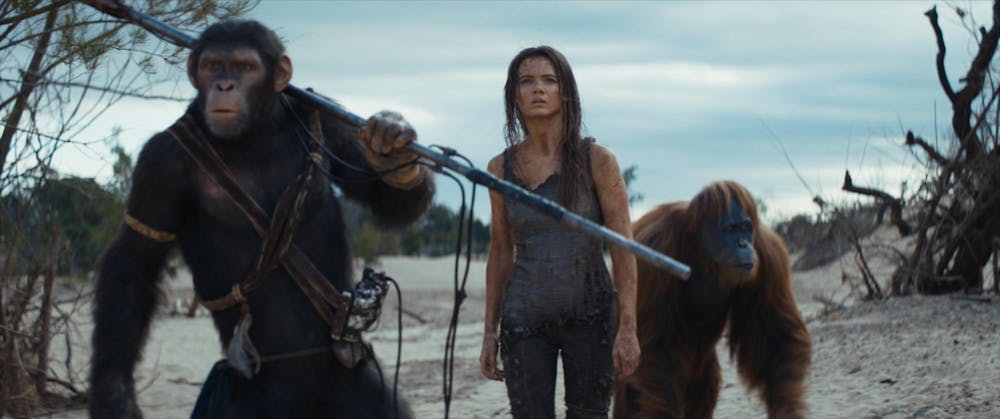The “Planet of the Apes” franchise is back with its newest installment, “Kingdom of the Planet of the Apes.” Unlike any of its predecessors, ‘Kingdom’ replaces the strong element of chaotic revolution inherent to the series with more philosophical ideas of coexistence.
Directed by Wes Ball, “Kingdom of the Planet of the Apes” serves as a stand-alone sequel to 2017’s “War for the Planet of the Apes.” The events of the film take place roughly 300 years after the events of its predecessor and paint an interesting picture about how Caesar’s visionary ideals shape the future for generations to come.
What happens to the environment when civilization grinds to a complete halt? “Kingdom” answers this question with breathtaking imagery. Centuries of human absence have permitted nature to reclaim what rightfully belongs to it. Lush forests permeate through crumbling cities of old, and wooden ape-designed settlements comprise the landscape.
These fantastic visuals in the first ten minutes of the movie are reminiscent of a scene of genesis — a new beginning for a new dominant species.
The story follows Noa, a chimpanzee from a clan of apes that specializes in falconry, and Mae, a young human who seems to be the lone remainder of an intelligent human civilization. Noa and Mae’s journey forces their encounter with Proximus Caesar, the self-proclaimed king of the apes and the “next” Caesar. Essentially, Proximus manages to twist the teachings of the original Caesar and use that against his populace, allowing him to rule with an iron fist.
The film is ultimately a role-reversal for apes and humans, set in an atmosphere where apes are the dominant species and humans have been reduced to mute, primitive nomads. The events of the previous film, "War for the Planet of the Apes,” lead into a future where a deadly man-made virus has mutated to give rise to newfound intelligence in apes but have the opposite effect on humans. This deprives them of their ability to speak or communicate intellectually. Interestingly, this is a solid callback to “Rise of the Planet of the Apes,” except this time the tables have turned.
The film’s beauty is in its simplicity. Noa and Mae, and the antagonist Proximus, all share the goal of accessing a man-made vault carved into the side of a cliff, that supposedly hides the last remnants of human technology.
The philosophically stimulating undertones that hide behind the simplicity are surprising. The magnitude at which Caesar is worshiped in this new primate hierarchy is incomprehensible; the apes see their long-lost leader as nothing less than a messiah — quite literally if Paul Atreides from “Dune” was a chimpanzee.
Additionally, Roman culture was probably one of Ball’s biggest influences while crafting this film. The dynastic and primeval ideals of the ape kingdom and the direct reference of Proximus being fascinated with Roman history are testaments to this.
Overall, I feel that the film may receive more criticism than it deserves at this point, but it is understandable why. The original trilogy of movies released in the last decade were completely centered around the life and struggles of Caesar, and the release of “Kingdom” marks the beginning of an entirely new trilogy.
Since Ball has already confirmed plans for two more sequels, “Kingdom” is simply the transition point, something entirely different from what viewers have seen in the previous three films.
“Kingdom of the Planet of the Apes” marks change, which I gladly embrace. This film opens new doors and possibilities for the series, and I’m excited to see where the franchise goes with them in the years to come.




